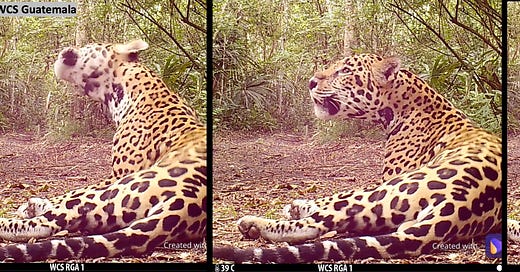A Jaguar's "Laugh" and a Magical Rain Forest Memory
One of the regular wildlife news nuggets distributed to the press by the Wildlife Conservation Society caught my eye earlier today and, amid my other work, kept poking at me. I realized it was because the video in the release took me back to one of the most magical moments I've ever had as a journalist.
The in-box item was a simple update on the status of jaguars, the great cat of the Americas, in Guatemala's Mirador-Rio Azul National Park. But the item centered on video and audio recorded by one of 50 camera traps distributed in the park to help track wildlife dynamics.
A male jaguar had plunked down in a clearing in front of the recording device, emitting a relaxed huffing call somewhere between a human chuckling and duck quacking. You really have to listen to get the effect. Read more from the Society here.
But here's why it has resonated all day. In the summer of 1989, I was in my third month running around the westernmost reaches of Brazil's portion of the great Amazon rain forest, completing my reporting for my first book, a chronicle of the life, murder and legacy of Chico Mendes, a rubber-tree tapper who organized both on-the-ground and international resistance to cattle ranchers who were violently grabbing land for pasture from Indigenous and rubber-tapping communities.
He was gunned down for his troubles. The murder had occurred the previous December, and in the intervening months Mendes had vaulted to martyr status.
That meant I had to work to be sure the accounts I was hearing from forest-dwelling men and women were not romanticized. With my friend and translator Fernando Allegretti, I ventured by motorized canoe up an isolated stretch of the Jurua River - a tiny branch of the Amazon - to get to a forest meeting of rubber-harvesting communities far from the towns where other journalists, and move producers, were camped out.
There we talked late into the night with two tappers, Joao and Antonio, who had hiked in from their forest holdings to learn about the rubber tappers' union Mendes and others had formed.
What they said became the closing lines of my book, The Burning Season.
Here's the passage.
~ ~ ~
At dusk one evening, [Joao] was walking home along an estrada [the trails rubber tappers make between the scattered rubber trees], surrounded by the buzz of cicadas and whoops of night birds. He did not like to hunt and so was carrying only a small, dull knife.
That is why he became nervous when he heard some large animal crashing in the brush up ahead. He crept forward and in the dim half light saw a large jaguar – the biggest he had ever seen. He froze and watched as the jaguar circled and then lay down, completely blocking the trail and oblivious of his presence. The jaguar lazily rolled over, stretched, and twisted from side to side, scratching its back.
Joao realized that the jaguar had no intention of hurting him, and he had no intention of hurting the jaguar. But it was getting late, and he needed to get home. Finally, he held his dull knife ready, just in case, and spoke to the animal: “Jaguar, I need to pass.” The cat leaped from the trail and vanished into the forest.
Just before everyone wandered off to find a place to string a hammock, Joao’s friend Antonio tried to imagine the world that the ranchers wanted to create, the world of open spaces that had already appeared in eastern Acre and was just starting to eat at the jungle along the Jurua. He could not imagine it; his forested world was so complete that any alternative was unthinkable. “If they cut the trees how can anyone live?” Antonio asked. “Can you imagine a country that has only pasture and cattle, without trees and man?”
He did not even consider the possibility that there might be men who were able to live outside the forest. “That is no country. Nothing will grow there. There is no game there. The ranchers will die in that kind of country."
For him, and, he hoped, for his children, the forest was home.
Here was the fundamental bond between a man and his environment that had been the basis for Chico Mendes’s own passionate defense of the Amazon. It was an intimate connection, transcending global considerations and political battles and personal conflicts.
“The life of the tapper is very hard,” Antonio said. “But it is much better than the life in the towns. It won’t be easy, even with the cooperative. We have to start our lives from the beginning. But we need to try. It’s hard for me to be outside the forest. When I went down the river to the city once, I started to get a big pain in my head. It only went away when I came back and was on my trail going home.”
~ ~ ~
We're surrounded now by glowing digital depictions of wildlife. They often feel like they're distancing us from the muddy, wet, buggy realities in non-human environments.
But sometimes, as in this case, they pull at us more meaningfully.
Have you had moments like this? I'd love to hear about them below.
They certainly don't have to occur in a remote corner of a rain forest.
Parting shot
It turned out that even that meeting up the Jurua was not out of reach of cameras and celebrity. The famed Brazilian songwriter and singer Milton Nascimento, arrived by riverboat. He was filming a project in the Amazon. But here his celebrity gave way to a simple intimate moment with the rubber-tapping communities as he sang his classic tune Coração de Estudante.
So were Joao and Antonio genuine? I'm still convinced the answer is yes.







